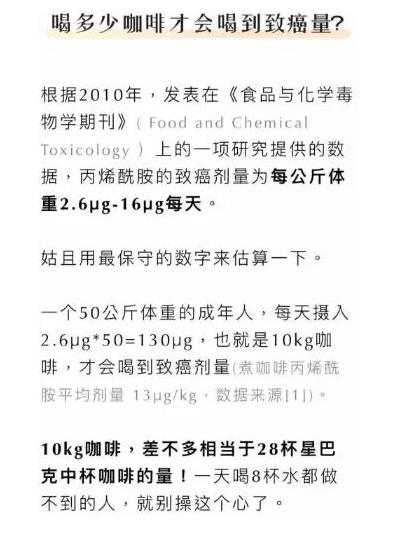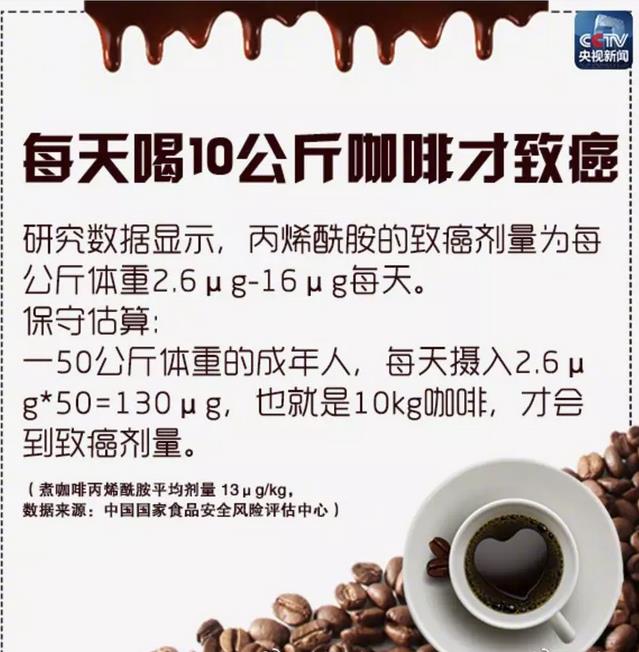After the rumor that "coffee causes cancer", let's dispel the rumor that "drinking 28 cups of coffee causes cancer"!

Professional coffee knowledge exchange more coffee bean information please follow the coffee workshop (Wechat official account cafe_style)
Recently, it has been inexplicably brushed by rumors that "coffee causes cancer", and articles refuting the rumors continue to be read on the screen.
One of the articles has spread widely, and one of the most important conclusions is that drinking 10 kilograms of coffee a day, equivalent to 28 medium cups of coffee, will reach the amount of cancer.

Many people look at it, wow, there are international journal data, there are very professional calculations, and such an intuitive 28-cup Starbucks as a reference, it is perfect.
As a result, many media also quote 28 cup Starbucks numbers, after all, this is easier to understand and spread than long-winded words.

Unfortunately, although it is very serious, this passage must have been written by a layman, perhaps copied from Baidu Tieba or Zhihu.
And 28 Starbucks was a mistake.
28 Cup Starbucks is a mistake, 28 Cup Costa is also a mistake, 280Cup Starbucks + Costa is also a mistake.
Why?
Because carcinogens have no threshold (safe dose)!
The figure of 2.6-16 micrograms is not the minimum carcinogenic dose, but TDI, or daily tolerable intake, which is mainly used to describe pollutants such as heavy metals.
TDI can be understood to mean that you will be fine if you eat so much every day, even if you exceed TDI, there is only a certain risk, and it does not mean you will really get sick, because there is still room for TDI.
Because TDI is mistakenly understood as a carcinogenic dose, all the subsequent reasoning and calculations are nonsense, and no matter how much literature is piled up, it is useless.
Of course, I agree that "coffee causes cancer" is an exaggeration.
Why is there no threshold?
The popular and intuitive explanation is that you know that smoking can cause lung cancer, but you can't answer how much you smoke every day will get lung cancer and how long you smoke will get cancer.
You know that drinking can lead to liver cancer, but you can't give an exact amount, how much you drink every day will lead to liver cancer, and how long you drink will get cancer.
Some people smoke and drink all their lives without getting cancer, while others never smoke or drink, but also suffer from lung cancer and liver cancer.
So for smokers who have lung cancer, you can't say that it's because of smoking, can you?
However, through statistical analysis, we can see a very clear correlation between smoking and lung cancer, so the scientific explanation is that smoking can increase the probability of lung cancer.
Remember "red meat causes cancer"? The scientific conclusion at the time was that eating one or two more processed meat products (such as sausages) a day increased the risk of colorectal cancer by 20%.
Is it true that you won't get colorectal cancer without eating any processed meat products? Well, you have a beautiful idea.
Similarly, you can say that ingestion of acrylamide can cause cancer, but you cannot be sure that the exact amount of acrylamide consumed will definitely lead to cancer, and there is no guarantee that you will never get cancer without acrylamide.
In the final analysis, cancer is a probability, or more directly, an element of luck.
How should carcinogens be treated?
1. First of all, we should look at the qualitative results, that is, whether it really causes cancer.
2. Next, we should see how much this carcinogen is, whether there is a limited standard and other reference values, and whether the carcinogenic probability needs to be worried.
3, and then you should see where the main contradiction is, because you may want to control the intake of this carcinogen.
Finally, we have to look at the trade-off between the pros and cons, that is, what else you get when you eat this carcinogen, and whether it is necessary to take this risk.
Last
In fact, "coffee causes cancer" is really a threat to the public. There is no need to worry about drinking a few cups a day.
However, it is undoubtedly wrong to appease the public with "drinking 28 cups of Starbucks a day causes cancer", "drinking 28 cups causes cancer", "drinking 280 cups causes cancer", "drinking Starbucks causes cancer" and "drinking Nestle causes cancer". In short, using one rumor to clarify another rumor looks like a joke.
Important Notice :
前街咖啡 FrontStreet Coffee has moved to new addredd:
FrontStreet Coffee Address: 315,Donghua East Road,GuangZhou
Tel:020 38364473
- Prev

Starbucks, the man behind the rumor that coffee causes cancer, was sued in court because of it.
Professional coffee knowledge exchange more information about coffee beans Please follow the coffee workshop (Wechat official account cafe_style) Last week (March 30, 2018) almost all the Chinese and English media reported that coffee is suspected of causing cancer. But most people, including the media, may not know that this doubt is not based on scientific evidence, but on political and legal manipulation. As early as
- Next

Does Starbucks coffee cause cancer? Rumors! Rumors! Rumors! Drinking the right coffee won't cause cancer!
Professional coffee knowledge exchange more coffee bean information Please follow the coffee workshop (Wechat official account cafe_style) Coffee lovers of two major ethnic groups who do not drink coffee describe coffee as a black bitter medicine, thinking that it will make the body allergic, palpitations and do not dare to drink; and even produce sleep disorders, do not drink after noon, this is the most common argument. Coffee lovers can be divided into two types: original black coffee.
Related
- How did the Salvadoran coffee industry develop in Central America?
- What exactly does the golden cup extraction of coffee mean?
- The Origin of Coffee flower
- [2023 Starbucks World Earth Day] there are more meaningful things besides free Starbucks coffee!
- What kind of coffee is there in Spain? 9 Flavors of Spanish Coffee
- Aromatic African coffee| Kenya's coffee culture and historical production area
- Liberica Coffee Bean knowledge: the characteristics of Liberian Coffee beans of the three original species of Coffee beans
- The origin and formula of Spanish latte introduces the taste characteristics of Bombon coffee in Valencia, Spain.
- How to adjust the solution of over-extracted coffee
- What is the tasting period of coffee beans? What is the period of coffee and beans? How should coffee wake up and raise beans?

